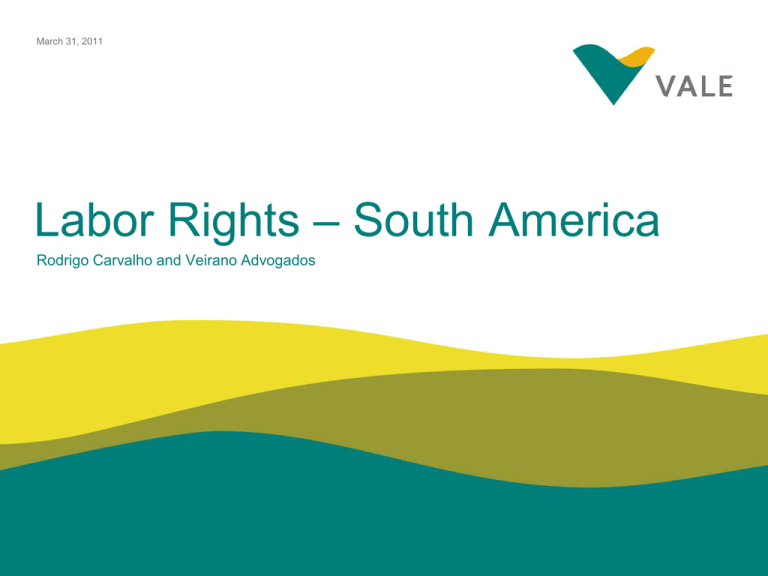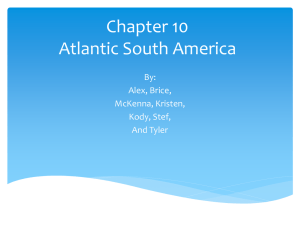
March 31, 2011
Labor Rights – South America
Rodrigo Carvalho and Veirano Advogados
Countries
Argentina
Brazil*
Chile
Colombia
Paraguay
Peru
Labor Rights – South America
March 31, 2011
*Veirano Advogados
General Aspects
1) “Principle of protection”
2) Legislation: Complex and detailed
3) Intervention of the Government in the labor and
employment issues (“Matter of Public Policy”)
4) “Remuneration nature” of fringe benefits – Economic
value of the benefit - risks / liability
Labor Rights – South America
March 31, 2011
General Aspects – Brazil
1) “Principle of reality”
2) High Brazilian cost
3) Salaries must be stated on a monthly basis, rather than
annual
Labor Rights – South America
March 31, 2011
Labor Rights – BRAZIL
Mandatory labor rights
Christmas bonus (13th Salary)
Vacation
Vacation bonus of 1/3
FGTS deposits
Fine of 50% over the FGTS account
Social Security Contributions (INSS)
INSS over the 13th Salary and
Vacation Bonus
INSS over Vacation
FGTS and Fine of 50% over the 13th
Salary and Vacation Bonus
FGTS and Fine of 50% over Vacation
Total 1 (not including vacation)
Total 2 (including vacation)
Labor Rights – South America
March 31, 2011
Appr. % of monthly remuneration
8,33%
8,33%
2,78%
8%
4%
27%
2,99%
2,25%
1,33%
1%
54,43%
66,01%
Labor Rights – SOUTH AMERICA
Trial Period
Employment contract for
a Stated Term
Argentina
90 days
Up to 5 years
Chile
No
1 year maximum
Managers: 2 years
Colombia
60 days
One fifth (1/5) of the contract
length not exceeding 60 days
if contract is for less than one
year
Paraguay
30 days: domestic service staff and
unskilled workers
60 days: skilled workers or apprentices
Highly skilled workers may set a
different period
1 year: unskilled workers
5 years: other workers
Exceptional in nature
Peru
3 months for ordinary employees
Up to 5 years
6 months for skilled employees
1 year for directors (manager positions)
Labor Rights – South America
March 31, 2011
Labor Rights – BRAZIL
Trial Period
Brazil
90 days (can be divided in 2 periods,
and renewed once, but not exceeding
maximum of 90 days
-- 45/45; 30/60; 60/30)
Labor Rights – South America
March 31, 2011
Employment contract for
a Fixed-Term
In special situations (services
the nature or transitory
condition of which justify the
fixed-term), up to 2 years,
renewable once, for a
maximum period of 4 years
Labor Rights – SOUTH AMERICA
Working Hours
Argentina
Colombia
Paraguay
General rule: 48 hours per week or 8
hours per day.
Peru
Chile
Labor Rights – South America
March 31, 2011
45 hours per week – maximum 10
hours per day
Exceptions: managers, employees not
directly supervised and others.
Labor Rights – BRAZIL
Working Hours
Brazil
General rule: 44 hours per week, 8 hours
per day, compensation being permitted to
reach the 44 hours per week
Special conditions:
-Bank employees: 6 hours per day, 30
hours per week
-Telemarketing: 6 hours per day, 36 hours
per week
Labor Rights – South America
March 31, 2011
Labor Rights – SOUTH AMERICA
Overtime Payment
Argentina
50% on weekdays and Saturdays up to 1
pm.
Chile
50%, maximum of two hours per day.
Colombia
25% weekdays, 75% on weekends and
75% at night.
Paraguay
50% in daytime; 100% in nighttime,
Sundays and holidays.
Peru
25% the hourly rate for the first 2 hours
and 35% the hourly rate for overtime.
Labor Rights – South America
March 31, 2011
Labor Rights – BRAZIL
Overtime Payment
Brazil
50% on weekdays and Saturdays; 100%
on Sundays and holidays.
Night work: an additional 20%
“Bank of hours”: maximum 2 hours per
day or 2,288 hours in a one-year period,
and compensated within a one-year
period; if more, those exceeding 2 hours
per day or 2,288 hours in the one-year
period must be paid as overtime.
Overtime has reflection on weekly paid
rest – normally 1/6 of the overtime
payment
Labor Rights – South America
March 31, 2011
Labor Rights – SOUTH AMERICA
Salary Reduction
Argentina
Not possible. Only by granting reasonable
consideration. The limit is not defined by law.
Chile
Not unilaterally, only with the employee's
express written authorization.
However, the employee could argue that he
was coerced into accepting the reduction
because of the impossibility of waiving the
labor rights.
Colombia
Paraguay
Peru
Labor Rights – South America
March 31, 2011
Labor Rights – BRAZIL
Salary Reduction
Brazil
General rule: not possible
Exception: Federal Constitution provides that
salary reduction is possible through a
collective bargaining agreement; however, to
the reduction of salary, there should be the
corresponding reduction in working hours.
Labor Rights – South America
March 31, 2011
Labor Rights – SOUTH AMERICA
Profit or Results Sharing
Argentina*
Colombia
Not mandatory.
(*Constitutional clause only; not regulated by law)
Paraguay
Chile
Mandatory.
a) 30% of annual net profits distributed among the employees in
proportion to their remuneration; or
b) 25% of the employee's annual income up to a defined limit (ensured
amount regardless of whether the company is profitable or not).
Peru
Mandatory if the company has more than 20 employees. Employer
must distribute among their employees a percentage of the annual net
income before taxes.
Telecon / industrial companies: 10%
Mining companies / Retailers / Restaurants: 8%
Remaining sectors: 5%
Labor Rights – South America
March 31, 2011
Labor Rights – BRAZIL
Profit or Results Sharing
Brazil
Not mandatory.
Constitutional clause, regulated by law No. 10,101/00– must be
negotiated between the company and its employees – either through a
collective bargaining agreement or with a commission chosen by the
parties, including a representative indicated by the Union
Labor Rights – South America
March 31, 2011
Labor Rights – SOUTH AMERICA
Stock Option
All Countries*
Not mandatory.
Risk of compensatory nature (salary): subject to
social security contribution and labor charges.
*Colombia: Parties can agree to have the
benefits as a non-salary factor.
Labor Rights – South America
March 31, 2011
Labor Rights – BRAZIL
Stock Option
No legislation on subject.
Brazil
Labor Rights – South America
March 31, 2011
Risk of compensatory nature (salary): subject to
social security contribution and labor charges.
Labor Rights – SOUTH AMERICA
13th Salary
Argentina
Yes. Payable in two installments: June / December.
Chile
Not mandatory; but it is a market practice.
Colombia
Yes. It is called "prima de servicios" equivalent to one
salary, payable in June and December (50% / 50%).
Paraguay
Yes. Equivalent to the twelfth part of every remuneration
earned by the employee (salary, overtime, commissions
or other).
Peru
Yes (monthly salary).
Labor Rights – South America
March 31, 2011
Labor Rights – BRAZIL
13th Salary
Brazil
Yes, equivalent to one-month fixed salary plus average
of variable remuneration.
Payable in two installments: November (or when
employee goes on vacation, between February and
October) / December.
Also due pro-rate upon termination (1/12 for each period
of 15-30 days)
Labor Rights – South America
March 31, 2011
Labor Rights – SOUTH AMERICA
Unemployment Severance Fund
Argentina
No.
Paraguay
Chile
Colombia
Peru
Labor Rights – South America
March 31, 2011
Not mandatory.
““Unemployment Solidarity Fund” – Social Security
System.
The “Cesantías", equivalent to one salary, which is
deposited in a fund before the February 15th of the
following year.
Compensation for Time of Services (CTS) which is
equivalent to a monthly salary for each full year of
service.
This is a half-yearly payment made in May and
November each year (50% / 50% each month). The CTS
is paid in a financial institution chosen by the employee.
Labor Rights – BRAZIL
Time of Service Guarantee Fund
Brazil
- FGTS – monthly deposit of 8% of the employee’s
remuneration in a joint account in the employee’s and
employer’s name at a public financial institution (CEF)
- Upon dismissal without cause employer pays a fine of
50% (40% to the employee; 10% to the government)
calculated on the existing balance in the account
(deposits + monetary correction + interest)
- Balance in the account belongs to the employee –
moment when withdrawal will be permitted is what varies
Labor Rights – South America
March 31, 2011
Labor Rights – SOUTH AMERICA
Vacation
Vacation Bonus
Argentina
14, 21, 28 and 35 days after 1, Yes, paid annual leave.
5, 10 and 20 years of service. Formula: monthly salary x
Vacation days / 25
Chile
15 workdays + an extra day
Not mandatory.
every 3 years after 10 years of
service.
Colombia
15 workdays per year.
Not mandatory.
Paraguay
12, 18 or 30 business days for
employees with up to 5, 5 to
10, or more than 10 years of
service respectively.
Yes.
Peru
30 days per year.
Yes. Equivalent to the
monthly pay.
Labor Rights – South America
March 31, 2011
Labor Rights – BRAZIL
Brazil
Vacation
Vacation Bonus
30 days per year (can only be
divided in 2 periods, on an
exceptional basis, none of
which smaller than 10 days)
Yes, paid annual leave (onemonth remuneration – fixed
salary plus average of variable
remuneration) plus 1/3
vacation bonus
Employees younger than 18
or older than 50 cannot divide
vacation
Calculated on the basis of
anniversary of hiring date:
first 12 months are acquiring
period, and the following 12
months are the granting
period
Also pro-rate paid upon
termination
Labor Rights – South America
March 31, 2011
Payment in double if vacation
not taken during granting
period
Employee can sell 10 days.
Labor Rights – SOUTH AMERICA
Restriction on Hiring Foreign Employees
Argentina
Paraguay
Foreigners must be residents. There is no limit in
the percentage of national employees.
Chile
Companies with more than 25 employees: no more
than 15% of foreigners.
Technicians and professionals that can not be
replaced in Chile are exempt from this limitation.
Colombia
Companies with 10 or more employees: 9% of
management employees and/or 8% of ordinary
employees shall be Colombians.
Peru
Foreign workers may be hired under the following
limitations:
(i) 20% of the total employees, and
(ii)30% of the total monthly payroll amount.
Labor Rights – South America
March 31, 2011
Labor Rights – BRAZIL
Restriction on Hiring Foreign Employees
Brazil
- Work authorization must be approved by National Coordination of
Immigration
- Depending on type of visa, there is or there is not an employment
relationship
- Law of 2/3 (number of employees and amount of payroll) -> only
applicable to employees; those who come without an employment
contract are not counted for purposes of the Law of 2/3
- Foreigners already residing in Brazil should be treated equally
and should not be counted for the Law of 2/3
- Nationals of Mercosul (Argentina, Paraguay and Uruguay) and of
Associated Countries (Chile and Bolivia) are not counted for
purposes of the Law of 2/3
Labor Rights – South America
March 31, 2011
Labor Rights – SOUTH AMERICA
Termination of Employment Contract (formal steps)
Argentina
Employers are legally allowed to terminate the employment agreements
at any time and for no cause.
Proceedings before the Ministry of Labor in the event of mass dismissal.
Chile
In general, each termination must be justified and ratified before a Notary
Public or Labor Inspector (Exceptions: Managers, lawyers, agents).
Termination settlement / “Finiquito” is strongly recommendable.
Colombia
The employment agreement can be terminated (i) by mutual agreement,
(ii) for cause, or (iii) without cause (severance pay applies).
There is no formal proceeding in this connection.
Paraguay
Notify the worker's dismissal to the Social Security Institute within the 3
(in the capital city) or 30 (in the country) days of termination.
Peru
No formal procedure applies.
In case of termination for disciplinary matters, a prior disciplinary
procedure must be observed.
Labor Rights – South America
March 31, 2011
Labor Rights – BRAZIL
Termination of Employment Contract (formal steps)
Brazil
Employers are legally allowed to terminate the employment agreements
at any time and for no cause.
In case of termination for disciplinary matters for union representatives
with tenure, a prior disciplinary procedure must be observed.
Termination of employees who have more than one year of time of
service must be ratified by the Union.
If legal deadline for severance payment is not observed (1st business day
after end of notice period, if worked, or up to the 10th day after end of
notice, if indemnified), employer has to pay a fine equal to one-month
salary
Proceedings before the Union in the event of mass dismissal (TST
jurisprudence)
Labor Rights – South America
March 31, 2011
Labor Rights – SOUTH AMERICA
Severance Pay
Argentina
1 month of salary per year of service or fraction
greater than three months, within certain limits.
Chile
1 month of salary per year of service and maximum
of 11 months with determined limits.
Colombia
For indefinite term duration contracts: 30 or 20 days
of salary for the first year of services and 20 or 15
additional days for each year subsequent to the first
(depending on monthly salary).
Paraguay
15 daily salaries per year of service or fraction over 6
months.
Peru
Indefinite term contracts: 1.5 of monthly salary per
year up to a maximum of 12 monthly salaries.
Definite term contracts: 1.5 of monthly salary per
pending month.
Labor Rights – South America
March 31, 2011
Labor Rights – BRAZIL
Severance Pay
Brazil
Indefinite term contracts:
Termination without cause:
- 50% fine (40%/10%) over FGTS balance
- Withdrawal of FGTS
- 30-day notice (attention to CBAs)
- Pro-rate 13th salary (calendar year)
- Accrued vacation, if any, and pro-rate vacation (anniversary
date of hiring), plus 1/3 vacation bonus
Resignation:
- Employee must give 30-day notice, under penalty of deduction
- Pro-rate 13th salary (calendar year)
- Accrued vacation, if any, and pro-rate vacation (anniversary
date of hiring), plus 1/3 vacation bonus
Termination for cause:
- No notice
- Accrued vacation, if any, and pro-rate vacation (Convention No.
132 of ILO), plus 1/3 vacation bonus
Labor Rights – South America
March 31, 2011
Labor Rights – BRAZIL
Severance Pay
Brazil
Fixed-term contracts:
--If contract provides that any party can terminate earlier by giving
notice, same rule as that for an indefinite term contract applies
-- If there is no such clause:
- in the case of termination without cause: payment of half of the
salaries which would be due until termination, plus FGTS fine and
withdrawal of FGTS funds, pro-rate 13th salary, accrued vacation, if
any, pro-rate vacation, and 1/3 vacation bonus
- in the case of resignation: half of the salaries which would be due
until termination, pro-rate 13th salary, accrued vacation, if any, prorate vacation, and 1/3 vacation bonus
- In the case of termination for cause: only accrued and pro-rate
vacation, plus 1/3 vacation bonus
Labor Rights – South America
March 31, 2011
Labor Rights – SOUTH AMERICA
Special Bars Against Dismissal
All countries
- Union members;
- Pregnant women; and
- Employees on sick leave.
Specific conditions
- Argentina: Newly married woman.
- Paraguay: Employees with over 10 years of
service.
Labor Rights – South America
March 31, 2011
Labor Rights – BRAZIL
Special Bars Against Dismissal
Brazil
- Union members
- Pregnant women (attention to CBAs)
- CIPA members
- Employees returning from sick leave after work accident
- Employees’ representative in companies which have more
than 200 employees
- Employees’ representative at the Council of the Contributors
to Social Security
-Employees’ representative at the Board of Trustees of the
FGTS
-Women suffering domestic violence
- CBAs: pre-retirement / employees returning from sick leave
which is not work-related / father after childbirth/ employees
with age for the obligatory military service / employees with LER
(repetitive strain injury) / transferred employee / SIDA
Labor Rights – South America
March 31, 2011
Labor Rights – SOUTH AMERICA
Note: None of the referred countries have ratified the ILO Convention Nº 158
regarding Termination of Employment.
Article 4
“The employment of a worker shall not be terminated unless there is a valid
reason for such termination connected with the capacity or conduct of the
worker or based on the operational requirements of the undertaking,
establishment or service”.
Article 5
The following, inter alia, shall not constitute valid reasons for termination:
(a) union membership or participation in union activities outside working hours or, with
the consent of the employer, within working hours;
(b) seeking office as, or acting or having acted in the capacity of, a workers'
representative;
(c) the filing of a complaint or the participation in proceedings against an employer
involving alleged violation of laws or regulations or recourse to competent
administrative authorities;
(d) race, colour, sex, marital status, family responsibilities, pregnancy, religion, political
opinion, national extraction or social origin;
(e) absence from work during maternity leave.”
Labor Rights – South America
March 31, 2011
Labor Rights – BRAZIL
Note: Brazil ratified the ILO Convention Nº 158 regarding Termination of
Employment in April 1996 but denounced it in November of the same year.
Labor Rights – South America
March 31, 2011
Labor Rights – SOUTH AMERICA
Strikes
All countries
Labor Rights – South America
March 31, 2011
In all countries, strikes may be called with the
purpose of a direct and exclusive protection of
workers' interests after unsuccessful bargaining.
Legal requirements must be fulfilled.
Labor Rights – BRAZIL
Strikes
Brazil
Labor Rights – South America
March 31, 2011
Same as in all other countries: strikes may be
called with the purpose of a direct and exclusive
protection of workers' interests after
unsuccessful bargaining.
Legal requirements must be fulfilled.
Labor Rights – SOUTH AMERICA
Note: All of the referred countries have ratified the ILO Convention Nº 98
regarding “Right to Organise and Collective Bargaining”.
Article 1
1. Workers shall enjoy adequate protection against acts of anti-union
discrimination in respect of their employment.
(...)
Article 2
1. Workers' and employers' organisations shall enjoy adequate protection
against any acts of interference by each other or each other's agents or
members in their establishment, functioning or administration.
(...)
Labor Rights – South America
March 31, 2011
Labor Rights – BRAZIL
Note: Brazil also ratified the ILO Convention Nº 98 regarding “Right to Organise
and Collective Bargaining”, but not the ILO Convention Nº 87 regarding
“Freedom of Association and Protection of the Right to Organise Convention”.
ILO Convention Nº 98
“Article 1
1. Workers shall enjoy adequate protection against acts of anti-union
discrimination in respect of their employment.
(...)
Article 2
1. Workers' and employers' organisations shall enjoy adequate protection
against any acts of interference by each other or each other's agents or
members in their establishment, functioning or administration.”
(...)
Labor Rights – South America
March 31, 2011
Labor Rights – BRAZIL
ILO Convention Nº 87
“Article 2
Workers and employers, without distinction whatsoever, shall have the right to
establish and, subject only to the rules of the organisation concerned, to join
organisations of their own choosing without previous authorisation.
Article 3
1. Workers' and employers' organisations shall have the right to draw up their
constitutions and rules, to elect their representatives in full freedom, to organise
their administration and activities and to formulate their programmes.
2. The public authorities shall refrain from any interference which would restrict
this right or impede the lawful exercise thereof.”
Even though Brazil did not ratify Convention No. 87, Article 8 of the Brazilian
Federal Constitution guarantees the right to free association and that the State
cannot demand a government authorization for the organization of an Union,
but forbids the existence of more than one Union to represent the interests of a
same category in a same territorial base.
Labor Rights – South America
March 31, 2011
Labor Rights – SOUTH AMERICA
Outsourcing
Argentina
The Contracting Party is jointly responsible for any labor, tax and
social security claims filed by the supplier’s employees and/or tax
authorities.
Chile
Possible for activities that are not part of the company's core
business. Subject to special regulations and liability of the company
that uses external services.
Colombia
Provided by specialized companies called "temporary services
companies."
Paraguay
The Contracted Party must assume all risks and perform them with
its own elements, managerial and technical autonomy. The activities
should not be related to the regular activities of the contracting party.
Peru
Outsourcing is only applicable if the subcontracted company
provides separate (functional, administrative, economic) full service
to the Contracting company. The mere provision of staff shall not be
considered outsourcing.
Labor Rights – South America
March 31, 2011
Labor Rights – BRAZIL
Outsourcing
Brazil
The Contracting Party has subsidiary liability for any labor, tax and
social security claims filed by the supplier’s employees and/or tax
authorities.
Precedent No. 331: in case of fraud, employment relationship is
declared with the Contracting Party
Nature of activity: allowed in secondary activities, but not in the
main ones
Outsources services may not be rendered on a personal basis
If subordination is to a representative of the Contracted Party at the
site of the Contracting Party, outsourcing may be deemed legal; if to
an employee of the Contracting Party, outsourcing for sure will be
deemed illegal
Labor Rights – South America
March 31, 2011
Labor Rights – SOUTH AMERICA
Employer Access to Employee’s Email
Argentina
E-mail is not an employee's personal asset, but a work tool provided by
the employer.
Employer’s regulation is possible if prior written notice was given to the
employee.
Chile
Same.
Preventive control.
Colombia
Same.
Case law is ambivalent since the right to privacy is constitutionally protected
(fundamental right).
Paraguay
Same.
The employee must be warned of any future monitoring measures. Prior
knowledge and implicit approval of the employee are necessary.
No case law in this regard.
Peru
Judicial authorities require: (1) the employee's prior authorization; (2) guideline
or policy developed / information; (3) monitoring limited to the employee's
professional activities and (4) a third party (a notary) may be used to verify the
correct behavior of the employer during the monitoring procedure.
Labor Rights – South America
March 31, 2011
Labor Rights – BRAZIL
Employer Access to Employee’s Email
Brazil
Same rule as in most of the other South-American countries: e-mail is not an
employee's personal asset, but a work tool provided by the employer.
To avoid discussions, it is advisable to give written notice to employee on
company’s policies on the subject.
Labor Rights – South America
March 31, 2011
Labor Rights – SOUTH AMERICA
Labor Court
Argentina
Two systems: (i) one intervened by a collegiate court, which only brings
appeals before the Supreme Court of the province addressed therein; and
(ii) a double instance system (Trial Court and the Appellate Chamber),
which in exceptional cases admits intervention of the Supreme Court of the
Nation.
On labor matters, the court tends to be protective of workers.
Chile
Trial courts with labor jurisdiction, which tend to protect the workers.
Colombia
Jurisdiction consisting of Labor Judges, the District Superior Court Labor
Chamber and the Supreme Court Labor Annulment Chamber.
Decisions may eventually be reviewed by the Constitutional Court. The trial
courts tend to protect the workers.
Paraguay
Two instances: Trial Courts and Court of Appeal. Generally the labor courts
tend to decide more favorably to the worker. The Supreme Court takes
account of constitutional issues.
Peru
Justice system for labor issues. Parties may submit to voluntary arbitration.
The Courts tend to be "pro-worker."
Labor Rights – South America
March 31, 2011
Labor Rights – BRAZIL
Labor Court
Brazil
Three instances: Trial Courts and Regional Courts of Appeal: facts and
law; Superior Labor Court: only law.
Exceptionally, Federal Supreme Court, for Constitutional matters.
On labor matters, the labor courts tend to be protective of workers.
No cost to employees.
Labor Rights – South America
March 31, 2011
Labor Rights – SOUTH AMERICA
Statute of Limitation
Argentina
2 years from the termination date.
Chile
2 years for legal rights in general
6 months for overtime pay both counted from the date
when became due
6 months for extra-legal rights (contractual benefits)
and 60 working days for unjustified dismissal, both
counted from the completion of services.
Colombia
3 years counted from the breach of right.
Paraguay
60 days to claim for unpaid prior notice and
compensation for dismissal without cause. 1 year for
any other claim.
Peru
4 years from the termination date.
Labor Rights – South America
March 31, 2011
Labor Rights – BRAZIL
Statute of Limitation
Brazil
Labor Rights – South America
March 31, 2011
5 years, but claim must be filed within 2 years from
the termination date
Trends
Labor Rights – South America
March 31, 2011
Trends
Increase of protective tendency.
Review of labor law
principle”.
/ effectiveness of “the non-waiver
Judiciary: employees "representing" others, even without
being affiliated to a recognized union deserve protection
against dismissal without cause.
Labor Rights – South America
March 31, 2011
Trends
Generalization re. Violation of worker's fundamental rights /
Fines imposed to employers.
Collective right: legal reform to improve the workers'
representation
bargaining.
Labor Rights – South America
March 31, 2011
through
unions
/
mandatory
collective
Trends
Labor Law is to be every day more protective to workers,
especially through the case law of the Constitutional Court.
Support for the disabled, pregnant women and "family-chiefmothers“.
Outsourcing / Associated Worker Cooperatives / Labor
Claims.
Labor Rights – South America
March 31, 2011
Trends
Fines related to omission by employers to contribute to
social security.
Possible elimination of the protection against dismissal
without cause figure after 10 years of uninterrupted service.
Youth employment / Labor Market.
Labor Rights – South America
March 31, 2011
Trends
Possible definition of an uniform rate (10%) for the
mandatory delivery of legal earnings.
Gradual implementation of the new labor procedure law (the
current rule is applicable only in some judicial districts Tacna, Arequipa, Cusco and others).
Labor Rights – South America
March 31, 2011
Trends
Father’s rights: Increase of paternity leave from 5 to 15
days and tenure of 30 days after childbirth (Bill No.
3935/2008); and for the parent solely responsible for financial
support of family, and provided he/she has been working for
the same company for more than one year, tenure from
moment pregnancy is confirmed until 6 months after
childbirth, limited to two children (Bill No. 454/2008)
Extension of maternity leave from 120 to 180 days: tax
incentive for companies who voluntarily give the 180-day
maternity leave (Law No. 11.770/2008);
PEC 64/07 approved by the Brazilian Senate in
August/2010 and pending approval by Congress extends
maternity leave to 180 days to all employees
Labor Rights – South America
March 31, 2011
Trends
Outsourcing: law regulating the matter / joint and several
liability
Deregulation / increased power to negotiations with Unions
Regulation of mass dismissals
Moral damages
Labor Rights – South America
March 31, 2011
Vale’s Legal Department
Labor, Employment and Social Security Area
Rafael Grassi – General Manager
rafael.grassi@vale.com – T. 55 21 3814-4544
Cláudia Ahmed – Legal Coordinator
claudia.ahmed@vale.com – T. 55 21 3814-4233
Rodrigo Carvalho – Legal Coordinator
rodrigo.carvalho@vale.com – T. 55 21 3814-9910
Note: This presentation was drafted with the assistance of following law firms:
• Trench, Rossi and Watanabe (General concept and info re. Argentina, Chile and Colombia)
• Payet, Rey, Cauvi Abogados (Info re. Peru)
• Ferrere Abogadoss (Info re. Paraguay)
•. Veirano Advogados (Info re. Brazil)
Labor Rights – South America
March 31, 2011
Veirano Advogados
Maria Luisa Soter - Partner
isa.soter@veirano.com.br – T. 55 21 3824-4600
Labor Rights – South America
March 31, 2011









